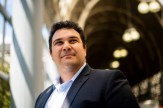Q&A with Nicholas Daniloff: The professor who came in from the cold
Journalism professor Nicholas Daniloff, a former United Press International and U.S. News & World Report reporter, covered the Cold War from Washington, London, Paris and Moscow for 30 years. In 1986, he was arrested in Moscow and held for 13 days in a KGB prison, accused of espionage. He’s been teaching at Northeastern since 1989. His memoir, “Of Spies and Spokesmen: My Life as a Cold War Correspondent,” came out last year.
Tell us about your new book. How long have you been working on it and why did you decide to write it now?
I entered the world of journalism in 1956 after college by joining the Washington Post as a copyboy. During the next 30 years I covered the Cold War from Washington, London, Paris and Moscow for United Press International and U.S. News and World Report. Since 1989 I have been teaching journalism at Northeastern. Some time ago, I decided to put down in writing what I experienced during my career before I forgot the details. It took me seven years while teaching to write my book, “Of Spies and Spokesmen: My Life as a Cold War Correspondent,” and more than a year to find a sympathetic publisher. Finally, in March 2008 the book came out.
How did you become interested in covering Soviet Russia?
I come from a Russian-American family, and an editor at The Washington Post told me I should cover the Cold War because of this family background.
Concerning your imprisonment by the KGB, was that your most harrowing experience as a foreign correspondent? How did you handle it?
Yes, it was shocking to be arrested and handcuffed without warning on a public street in Moscow. Once in prison you have no control over your fate, and the whole trick was to survive. My wife was a great help in keeping my spirits up, and, of course, I am grateful to President Reagan for his intervention in the matter, which became a big international scandal.
You taught journalism to students in former republics of the Soviet Union. Do you find differences between those students and American journalism students?
I taught journalism in Azerbaijan and Uzbekistan, giving lectures there in English and Russian. Undergraduates in both those countries were fluent in three languages: their local language, English and Russian. They were better dressed than American undergraduates, never wore baseball caps in class, and more polite. However, American students are more relaxed, more inquisitive, more assertive.
Are they able to publish their stories in these countries?
Publication of stories criticizing the political leadership was not permitted but descriptions of some societal ills (not prostitution) was possible.
Russia is itself going through a rocky time with transition from Putin to Medvedev. Tell us your thoughts.
Russia has been drifting back to its old traditions of authoritarianism. I am disappointed but not surprised. When I left Moscow in 1986 after a five-year assignment, I warned not to expect democracy to take hold in Russia for two generations or 40 years. I guess I was too optimistic. Russia is an enormous country, difficult to govern. Its leadership has traditionally been wary of its diverse populations of more than 100 different ethnic groups. Not surprisingly, Russia feels that a strong hand—not a democratic hand—is needed to ensure stability and economic development. Today I would like to see an independent judiciary and independent media develop in Russia even before free and fair elections.
What are some of the biggest challenges facing the press today?
Probably the biggest challenge facing the press today is financial. Falling advertising revenue is forcing newspapers to make drastic cutbacks in expenditures, layoffs, and closure of foreign bureaus. Also disturbing is the loss of credibility by the press, which has been caused by inaccurate, sensational, and intrusive reporting.
It appears that print journalism is at a crossroads. How can the journalism industry find opportunity now and in the future?
American journalism is in transition but it is not going to disappear. You might ask: Why study journalism? It is an increasingly complex field. The Internet is becoming more prominent as a conveyer of news. Community newspapers, which play a vital role in informing local jurisdictions, will survive and some will flourish. Television and cable will continue to be a main source of news for the mass of our people. And a small number of journalists with hidden entrepreneurial skills will surprise us with new ideas and developments yet unborn.





